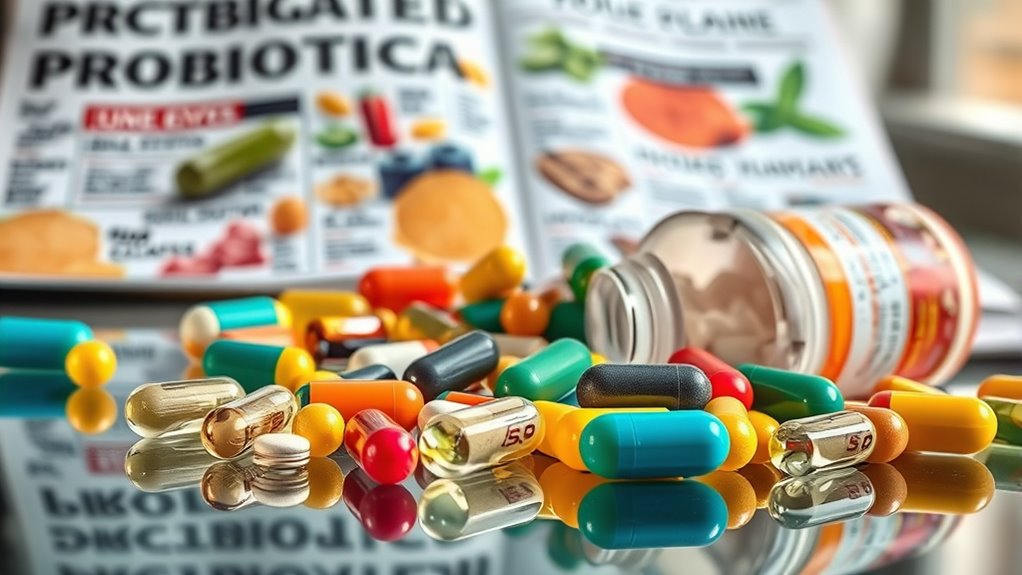Many probiotic ads oversimplify or exaggerate their benefits. They don’t always mention that not all products deliver viable bacteria to your gut or that fermentation alone doesn’t guarantee health improvements. The effectiveness depends on specific strains, proper processing, and whether bacteria survive digestion. If you want to understand what truly supports gut health and avoid common misconceptions, there’s more to learn about choosing the right foods and supplements.
Key Takeaways
- Not all probiotic products contain live, viable bacteria that reach the gut; packaging and storage conditions matter.
- Fermentation enhances food nutrition but doesn’t guarantee high probiotic content unless labeled “live and active cultures.”
- Consuming probiotic foods or supplements alone doesn’t ensure gut health; strain types and survival through digestion are critical.
- Dietary fiber fuels beneficial gut bacteria, supporting microbiome diversity and overall health beyond just regularity.
- Many probiotic ads oversimplify benefits, ignoring factors like bacterial viability, strains used, and individual gut conditions.

Many common beliefs about gut health are actually myths that can mislead you and hinder your well-being. One of the most widespread misconceptions revolves around probiotic foods and supplements. While they’re often promoted as instant fixes for gut issues, the reality is more nuanced. Probiotics are living bacteria that can benefit your gut, but their effectiveness depends on several factors, including the specific strains used and how well they survive your digestive process. Many ads emphasize the presence of probiotics without explaining how they work or whether they reach your intestines alive. Simply consuming probiotic-rich foods like yogurt or supplements doesn’t guarantee improvements unless they contain the right strains in viable amounts. Additionally, the viability of probiotics can be compromised during manufacturing and storage, making it important to choose products carefully.
Another myth involves the role of fermentation processes in gut health. Fermentation is a natural process that enhances the nutritional profile of certain foods, creating beneficial bacteria and compounds that support your microbiome. Foods like sauerkraut, kimchi, and kefir undergo fermentation, which can introduce helpful probiotics into your system. However, not all fermented foods are created equal—some may contain minimal live bacteria if they’ve been heat-treated or processed. Understanding this helps you make smarter choices; just because a product is labeled “fermented” doesn’t mean it’s packed with probiotics. It’s essential to look for products that specify live and active cultures on the label. Recognizing the importance of viable bacteria can help you select the most beneficial foods for your gut health.
Dietary fiber plays an equally critical role in maintaining gut health, yet many people underestimate its importance. Fiber acts as food for your beneficial gut bacteria, fostering a diverse and resilient microbiome. It influences fermentation processes in your gut, producing short-chain fatty acids that reduce inflammation and support intestinal integrity. Despite this, some believe that fiber is only necessary for regular bowel movements, which is a limited perspective. Adequate fiber intake can help prevent conditions like constipation, but it also impacts immune function, mood, and overall health. Incorporating a variety of fiber-rich foods like fruits, vegetables, whole grains, and legumes ensures your gut bacteria have the nutrients they need to thrive.
Frequently Asked Questions
How Do Probiotics Actually Affect Long-Term Gut Health?
Probiotics can positively impact your long-term gut health by enhancing microbiome diversity and aiding antibiotic recovery. When you take probiotics regularly, you help restore beneficial bacteria that antibiotics may diminish. This supports a balanced microbiome, which is essential for digestion, immunity, and overall well-being. Over time, maintaining this diversity can lead to fewer digestive issues and a stronger gut, making probiotics a valuable part of your health routine.
Are All Probiotic Strains Equally Effective for Everyone?
Think of probiotics as different keys fitting unique locks; not all strains work equally for everyone. Strain specificity means some are better suited to your gut, but individual variability affects their effectiveness. You might find relief with one probiotic, while another provides no benefit. So, it’s essential to choose strains tailored to your needs, rather than assuming all probiotics offer the same benefits for every person.
Can Probiotics Replace a Balanced Diet for Gut Health?
Probiotics can’t replace a balanced diet for gut health because they don’t provide the prebiotic synergy your gut microbiome needs. While supplements can help, eating fiber-rich foods supports your microbiome’s diversity and function better. You should focus on a nutrient-rich diet alongside probiotics to optimize your gut health. Remember, a balanced diet fosters a thriving gut microbiome, which is essential for overall well-being.
What Are the Potential Side Effects of Taking Probiotics?
Did you know about 10% of probiotic users experience side effects? While generally safe, side effect concerns can include bloating, gas, or mild stomach discomfort. These issues often depend on strain specificity, meaning some strains may cause more reactions than others. Always check the specific probiotic strain, and talk to your healthcare provider if you notice persistent or severe symptoms to avoid potential side effects.
How Do Probiotic Supplements Compare to Fermented Foods?
When comparing probiotic supplements to fermented foods, you’ll find fermented beverages like kefir and sauerkraut often offer greater probiotic diversity and natural benefits. Supplements can provide targeted strains, but they might lack the variety found in fermented foods. Consuming a mix of fermented beverages regularly helps support your gut health naturally, ensuring you get a broad spectrum of probiotics that work together to improve digestion and immunity.
Conclusion
Don’t fall for the shiny ads promising instant gut miracles. Your gut’s health is a complex puzzle, not a quick fix. Think of probiotics as tools, not magic bullets, and remember that a balanced diet, regular exercise, and patience are your true allies. By seeing through the hype and understanding the facts, you’re steering your gut health like a skilled captain steering through stormy seas—resilient and in control.









